- Home
- Jack Gantos
Jack's New Power Page 4
Jack's New Power Read online
Page 4
One day before we had left Florida to live in Barbados, Mom had come into my room with her industrial-strength vacuum cleaner.
“I have something big to tell you,” she said.
I was suspicious. Any minute, I expected her to lunge at me with the vacuum nozzle and try to suck the wax out of my ears.
“We’re getting ready to move two thousand miles away. Your dad got a new job in Barbados.”
I already knew this. Betsy had overheard them talking at night and had told me.
“Well, I want you to know that we can’t take everything we own. We all have to make some sacrifices. You can bring your clothes, your books, and your diaries. But not”—and she waved the vacuum nozzle around the room—“all this junk. Candy wrappers. Bottle caps. Insects. Newspaper clippings. And I mean it. So get rid of it, or I will.”
She turned and marched out of the room, leaving the vacuum behind as a threat. The first thing I did was open the vacuum cleaner and go through the dust bag. I had hidden a few dried bugs in Betsy’s room, but since Betsy hadn’t screamed and come after me with a shoe, I figured Mom had found them first and sucked them up. And, sure enough, they were in the dust bag. I picked them out and blew the dust off their cracked skin. Then I slipped them into my top pocket.
Mom and I had been fighting over my junk for a long time. She thought I was too old to collect stuff that she claimed had no meaning. But my junk meant everything to me. We had already moved about a dozen times, and I wouldn’t have any souvenirs of where I had lived, who my friends and neighbors were, and what schools I went to, unless I saved little bits and pieces of it. I had already learned how to save a lot of my flat junk by hiding it in my normal diary. I had stapled in my baseball cards, glued in my stamp collection, taped in my pennies, as well as my photograph collection, newspaper clippings, Chinese fortune-cookie fortunes, postcards, and gum wrappers. But chunky stuff, like rocks and shells and bottle caps and marbles, was difficult.
Then I had remembered a movie where a detective took a big heavy book down from a library shelf and opened it up. Inside, the book was hollow. The middle of all the pages had been carved out, which left a big hole behind. Inside the hole was a bottle of poison. I didn’t have poison, but I liked the sneaky hiding place inside the book. So I went out to the living room and took a bunch of old books that nobody ever read down from a shelf. Then I went out to the garage, where Dad kept all his carpentry tools. With a wallboard knife, I cut out the middle of the pages. It was easy. Then I went back into my bedroom and began to fill the books up with all my junk.
When it came to my tool collection, I carved out the inside of the fat Amy Vanderbilt book on table manners. When I finished, I put in my pliers, screwdriver, tack hammer, screws, nails, nuts and bolts.
That was two months ago. Now I took out the needle-nose pliers. I had to perform surgery. Whatever I had stepped on throbbed like a bad tooth. When I held a mirror up to the bottom of my foot, I saw that it wasn’t a thorn or a piece of glass. It was a plantar wart about the size of a tiny cauliflower. “Wow,” I said when I saw it. “Gross.” I put the mirror down and touched it. “Ouch,” I cried. I looked at the wart again. I couldn’t believe something was growing on me, growing in me. What nerve. But it scared me. It was like something alien taking over my body. As though I might suddenly grow a second nose or a third ear. I couldn’t let the wart take over my body. I grit my teeth and got a deep grip on it with the pointy tips of my needle-nose pliers.
“So long, Mr. Wart,” I growled. “One … two … three.” I squeezed down on the handles and yanked the wart straight out. I thought I heard something rip.
For an instant I felt relief, then suddenly the pain hit me like a hot needle jammed into my foot.
“Aggghhhh,” I moaned and rolled over on my side. I held my breath and fought back the pain. “Mind over matter,” I said to myself, and pounded the floor. “Mind over matter,” I repeated. But I was losing the battle. The pain roared back and blood squirted out of the hole just like it had squirted out of the chicken necks.
I crawled over to my bed and pulled myself up by the headboard. “Oh, crap,” I said. “Oh, crap.” I hopped over to the door and opened it. I peeked down the hall. Betsy had her door closed, and no one else was in sight. I hopped on my good foot and leaned against the wall. Every now and then my hurt foot touched the floor and I nearly hit the roof.
When I got to the bathroom I locked the door. I held my foot over the bathtub spigot and turned on the water. “Aggghhh.” It burned.
When the blood slowed, I wrapped the hole with gauze from the first-aid kit and taped it up.
Suddenly I heard Betsy shout. “What’s this blood in the hall?” She pounded on the bathroom door. “Open up!” She tried the knob. “You know you’re not allowed to lock the door.” She pounded on it again. “Is this chicken blood?”
“No,” I shouted, and hurried to wipe up the blood in the tub with toilet paper and flush it down the commode.
“Mom!” she hollered. “Mom! Come here.”
Then Mom was pounding on the door. “What’s all this blood?” she asked.
Now Betsy’s done it, I thought. I took a deep breath and opened the door. “I only yanked a wart out of my foot,” I said casually. “I just put on a bandage. It’s no big deal.”
“You’re more disgusting than I thought,” Betsy said and twisted up her face into a warty shape.
“Did you clean it out well?” Mom asked.
“Yes,” I replied.
“Did you use peroxide?” she asked.
“Yes,” I said, lying.
“Okay, then. Just clean up the hall.”
“Disinfect it,” Betsy added. “Use hot water. I don’t want any voodoo wart seeds getting on my feet.”
“There is no such thing as a wart seed,” I said.
“Just look in the mirror,” she cracked back.
“Enough,” Mom ordered. “Jack, clean the hall.”
“Okay,” I moaned, and hopped away like a lame rabbit.
That night my foot was killing me. I sat on my bed with a penknife and carved a little hole into the cover of my diary. When it was big enough, I removed a wad of tissue from my shirt pocket. I unwrapped the tissue and inspected the wart. I didn’t want to touch it, because of the wart-seed idea. I didn’t want a family of warts growing on my fingertips. I jabbed at the wart with the point of my knife, then pressed it into the hole with the handle. Just to be on the safe side, I stuck a piece of clear tape over its bumpy surface. It looked like something dead in a glass coffin. “Rest in peace,” I whispered.
I opened my diary and drew a rough map of our neighborhood over both pages. I wanted to make a list of all the people who might be my friend. I didn’t want Betsy to beat me at making new friends. She was always boasting that she was more popular than I was, because I was clueless on how to be a friend. But I knew more than she thought I did. Dad had taught me the rules. Being a good friend meant you were a good listener, always told the truth about what you liked and disliked, and tried to lead by example, not by threats. And you had to know how to tell good jokes and stories. I knew he meant that telling good jokes and stories was the most important part. The other stuff he just said because it was his job to sound like a parent.
I wanted to sneak up and down the street and locate the neighbors’ names so I could write them on my map. But my foot hurt too much to creep around. I limped over to my French doors and stepped outside. I climbed the avocado tree until I was high enough to see down the street. I had my diary with me. It was dark and there were no streetlights. Each house looked like a ship out on the ocean. I could only spot the houses by the light in their windows. Actually, I could hear more than I could see. It was so quiet that I heard a boy at one house ask his mother if he could have a bowl of ice cream. She said no. I wrote “no ice cream house” down on my map of the neighborhood. I didn’t know their names yet, but I knew I wouldn’t be going there for dessert.
Ev
ery time I needed to write something down, I had to strike a kitchen match and hold it with my left hand while I wrote with my right hand. When my fingertips started to get hot, I dropped the match inside the diary and smothered it.
I watched a car turn the corner. It passed our house and stopped three houses down. A huge family piled out. They spoke loud but I couldn’t understand them. It sounded like Arabic. My grandfather was from Lebanon. He’d died before I was born, but Dad sometimes recited poems in Arabic, so I knew how their talk sounded.
Once the car doors closed, it was pitch-black. They all went inside their house, and room by room, lights appeared in the windows. I struck a match to make a note on my map. “Arabs,” I wrote.
For a long time, nothing happened. From staring out into the shifting darkness I got drowsy. I didn’t want to fall asleep and pitch headfirst out of the tree and snap my neck. I had had enough pain for one day. I climbed down and went to bed.
Three days later I woke up speckled with boils and blisters.
“Ahhhg!” I cried out in a panic. “Help! I’m sick! I’m dying!”
I went running to Mom. “Oh my God,” she said, horrified. Then she hollered for Dad. “Jack!” she yelled. “Come here quick!”
Dad took one look at me, made a disgusted face, and grabbed his car keys. Mom ordered me to get dressed and ran to her room. As I was putting on some clothes, I heard her talking to a receptionist at Bayley Clinic. “It’s an emergency,” she said. “We’ll be right over.”
She was right. Dad drove like a maniac. “Move it, you slugs!” he kept shouting out of the window. He honked the horn the entire time, madly waved his fist, and nearly flattened a dozen people on bicycles.
The building was like Dr. Frankenstein’s laboratory. A nurse and a doctor were waiting for us. They rushed me into an examination room and told Mom and Dad to wait in the hall. The nurse made me lie down on a bed while the doctor injected a needle into my sores and withdrew samples of the pus and blood. He seemed very serious. “Did you eat anything unusual?” he asked and poked at my draining sores with a cotton swab.
“No,” I replied.
“Any bug bites?”
“No.”
“Any plant allergies?”
“No.” He didn’t ask about warts and I didn’t volunteer anything.
At the end of the examination he told me to stand up and then he escorted me to the waiting room. I put a big smile on my face to keep Mom and Dad from going crazy. But inside I was full of fear. Maybe Betsy was right and I had some voodoo chicken plague.
“I’ll call you tomorrow,” he said calmly to Mom and Dad. “I’ll have some blood results by then.”
That night I heard my parents talking about me. They were standing toe to toe in the dining room.
“I want to go home,” Mom said. “The nurse said it might be leukemia.”
“What does she know?” Dad said. “If it was leukemia, the doctor would have said something.”
“Well, I’d feel better if we were back in Florida.”
“Forget Florida,” Dad said. “We’re living in paradise.”
“It’s not paradise if you die here.”
“Don’t get carried away. He’ll be fine. Let’s just see what the tests show before we get too worked up.”
“I don’t want to take a chance on his health.”
“We’re not taking chances. You’re getting hysterical.”
Mom’s voice rose a full octave. “Hysterical!” she screeched. “If the test results are bad, we’re leaving.”
I didn’t want them to catch me spying, so I hopped down the hall on my good foot. Now I’ve done it, I thought. I’ve ruined paradise.
The next day the doctor called us back to the clinic. Mom asked him if I had leukemia.
He smiled. “No. It’s just simple blood poisoning.”
Then he turned and stared directly at me. I felt my heart racing. I thought of that little chicken just before Marlene had lowered the machete. Whack! And then she’d cooked him.
“Did you step on anything rusty?” he asked.
Mom’s eyes widened. “You did tell him about your wart, didn’t you?”
“No,” I said to her. She rolled her eyes. Then I faced the doctor. “I pulled a wart out of the bottom of my foot with a pair of pliers.”
The doctor leaned forward and placed his hand on my forehead. He must have thought I had a fever and was talking nonsense.
I looked over at Mom. She hunched down in her seat and covered her eyes with her hand.
“May I see your foot?” the doctor asked.
I pulled off my shoe, then my sock. He unwrapped the gauze bandage. “It doesn’t hurt so much anymore,” I said.
He poked at it. “It looks a bit angry,” he replied. “How clean were the pliers?”
“I found them on the street,” I said. “They were a little rusty.” I turned to Mom. She was staring at me in disbelief.
“Well, that would explain it. What you need are antibiotics for the infection and Gentian Violet for the boils.”
In a minute the nurse arrived with a big purple bottle. “Please remove all of your clothing,” she said. She unscrewed the cap and poured the medicine into a shallow bowl. Then she put on a pair of rubber gloves and dipped balls of cotton into the medicine.
I took off my clothes and watched as she painted me purple from head to toe. Mom stood to one side and smiled.
Betsy and Pete ganged up on me. Every chance they had, they made fun of me. Two days later, Mom had to reapply a fresh coat of purple paint. When I slinked out onto the breakfast porch Dad took pity on me.
“You’ve got a choice, purple boy,” he said and rubbed the top of my head. “Either we can go to the kennel and get a dog, or I can take you to the carnival.”
That was an easy decision. “Carnival,” I replied.
“Good choice,” Betsy mumbled. “There’s no reason to scare man’s best friend to death.”
“Give him a break,” Dad said. “It’s not easy being purple.”
“It’s not easy being seen with him either,” she replied.
“I’ll be ready in a few minutes,” I said. I retreated to my bedroom. Earlier I had carved a foot-shaped pad of foam rubber out of my bed pillow. I taped it into my sneaker and tried it on. When I walked a little on the side of my foot, it didn’t hurt at all. Okay, I said to myself. I’m making a comeback. Maybe I’ll find a friend at the carnival.
At the carnival we played some skill games. We threw hoops over bottles and shot at ducks and tested our strength. I didn’t win anything.
“Too bad they don’t have a chicken-chasing contest,” Betsy said when Dad stepped away to speak with a man who was working with him on the hotel renovation. “You might win a stuffed wart.”
I glared at her.
Just then a booming voice came out of the overhead loudspeaker. “Ladies and gentlemen, come into the Egyptian tent and see one of the seven wonders of the natural world. Come see and hear the incredible life of the Alligator Lady. She walks! She talks! She crawls on her belly like a slime-y rep-i-tile!”
“Let’s go there,” I said.
“I have a better idea,” Betsy said. “Let’s put a tent around you … ‘He’s poxed! He’s purple! He chases headless chickens like the purple freak he is!’”
“Come on, Pete,” I said. “Let’s play some games.”
“Forget it,” he replied and wrinkled up his face at me. He was definitely out of my control. Betsy had won him over.
“You’ll be sorry you betrayed me,” I said. “Betsy will turn you into a priss.”
“Come on,” Betsy said and grabbed Pete’s arm. “Let’s go look at the baby goats. They’re so cute.”
“See what I mean,” I said.
I waited until they were out of sight. Then I went to the baseball throw. The man running the booth eyed me suspiciously. I bet he wanted me to wear gloves. For some stupid reason I had tears in my eyes, and when I threw at the bottles,
I couldn’t hit a thing. The first two balls missed by a mile. I threw the third so wide of the mark I hit the operator’s coffee cup. It flew off the table and smashed against a chair leg.
“Hey!” he said. “You’re going to have to pay for that.”
“You’ll have to touch me first,” I shot back, then turned and ran. Being disgusting was good for something. I dodged a bunch of people as I cut down the path past the game booths. Everywhere, there were painted signs and posters of silly clowns and goony animals with crossed eyes and crazy costumes. I must have looked like one of them that came to life. A kind of diseased Pinocchio, I thought. I kept running and people kept stepping out of my way. I passed the bumper cars, the Ferris wheel, the spinning teacups, the centrifugal force machine. I felt like I could run forever. My foot didn’t hurt at all. I wanted to run home. I just didn’t know the way.
When I slowed down I didn’t see anyone from my family. I spotted the Alligator Lady tent and walked over to get a closer look. They charged a dollar, so I paid up and went in. It was dark and I didn’t seem so purple. Egyptian flute music was playing from a tinny speaker. There was a little stage with a grassy curtain and papier-mâché palm trees. In front of the stage, men were lined up about three deep. It was hot and smelly under the tent, like a swamp. A barker in a dirty white suit and pith helmet was explaining that the Alligator Lady was netted by Egyptian fishermen on the Nile. “She’s the cousin of mermaids … She is over a thousand years old and has seen her husband killed by Napoleon’s troops and turned into riding boots.”
The music speeded up. The curtain lifted and a large woman in a reptile suit crawled out. I could see where the zipper had split down the side of her costume. She must have gained a little weight. A long alligator mask was strapped to her face with thick green elastic straps. They tried to disguise the phony suit by sticking a lot of slimy leaves and pond scum all over her.
She crawled across the stage on her belly like someone crawling under her bed. She peered up at the circus barker and hissed.

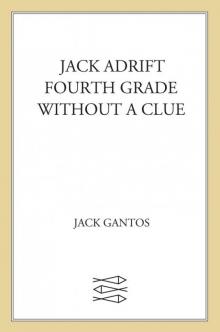 Jack Adrift
Jack Adrift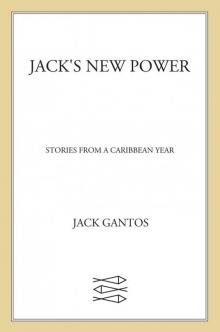 Jack's New Power
Jack's New Power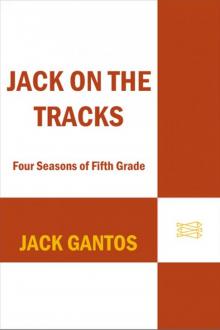 Jack on the Tracks
Jack on the Tracks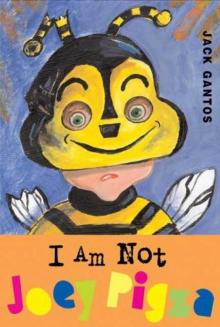 I Am Not Joey Pigza
I Am Not Joey Pigza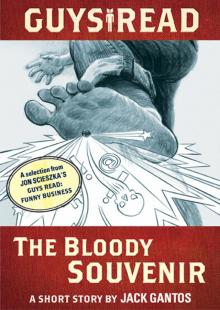 The Bloody Souvenir
The Bloody Souvenir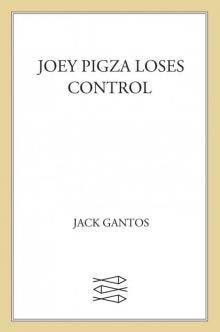 Joey Pigza Loses Control
Joey Pigza Loses Control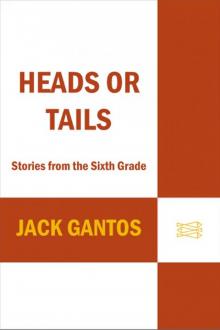 Heads or Tails
Heads or Tails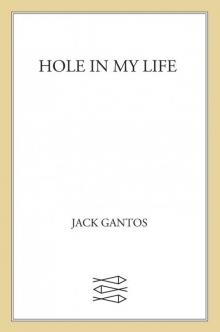 Hole in My Life
Hole in My Life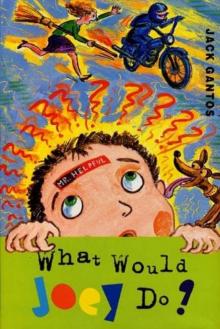 What Would Joey Do?
What Would Joey Do?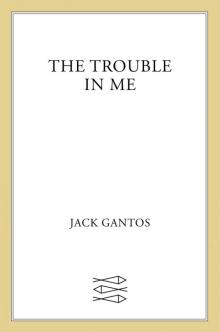 The Trouble in Me
The Trouble in Me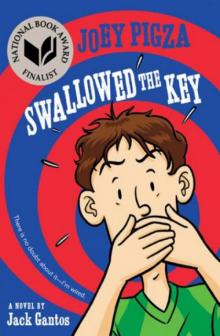 Joey Pigza Swallowed the Key
Joey Pigza Swallowed the Key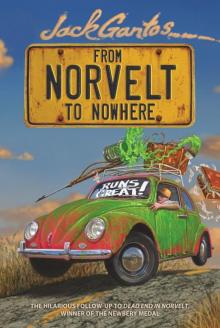 From Norvelt to Nowhere (Norvelt Series)
From Norvelt to Nowhere (Norvelt Series)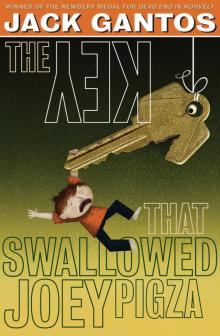 The Key That Swallowed Joey Pigza
The Key That Swallowed Joey Pigza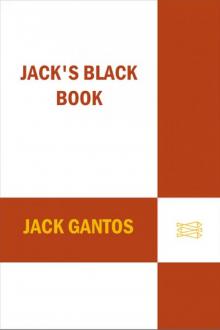 Jack's Black Book
Jack's Black Book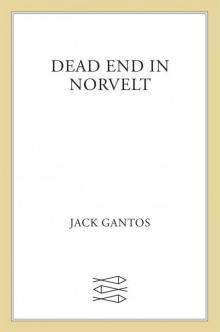 Dead End in Norvelt
Dead End in Norvelt